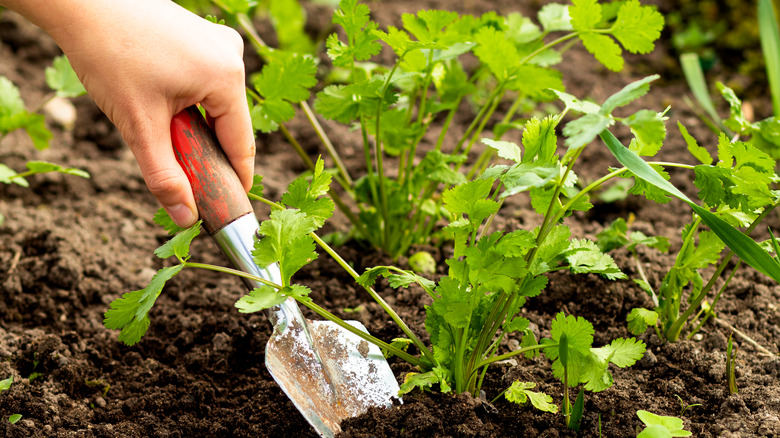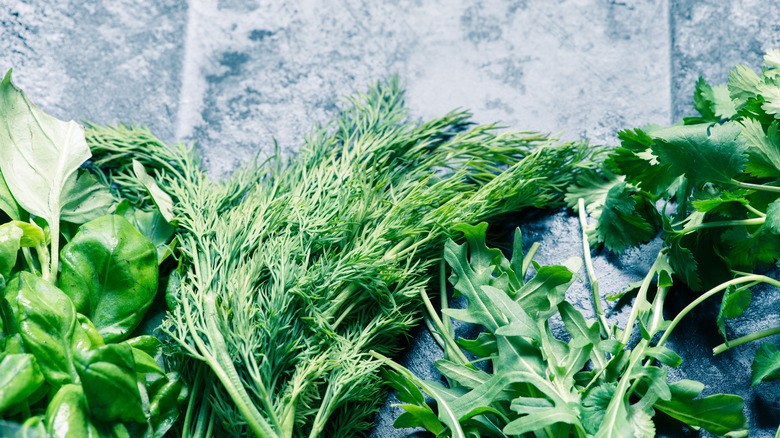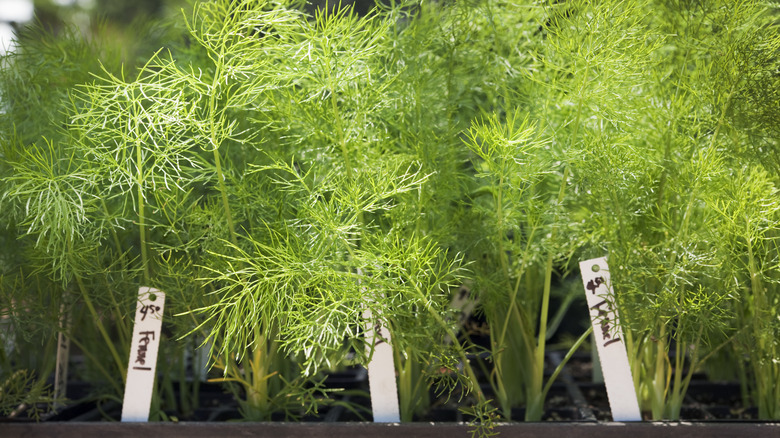Avoid Planting These Two Herbs Next To Each Other
Herbs are generally credited for being low-maintenance plants that make a great gateway for beginners to enter the world of gardening. On top of serving as a dream for a culinary-enthused homeowner, herbal gardens add lush greenery to a front lawn or backyard and support the environment by drawing endangered insects and helping reduce the effects of climate change. Herbs calling for similar care conditions tend to grow well together. However, just because two plants are classified as herbs doesn't necessarily mean they get along when grown next to each other.
Popular herbs fennel and cilantro are common examples of plants that grow best when kept at a respectable distance. Refrain from planting fennel and cilantro in close quarters in gardens since the two herbs are likely to compete for nutrients in the ground and ultimately end up prohibiting each other from growing to their full potential.
The practice of growing different plants adjacent to one another for mutual benefit is known as companion planting. Certain plants exhibit specific properties that other plants find useful in their own development, ranging from shade-offering capabilities to an innate propensity to keep away harmful pests. However, planting two incompatible crops in close proximity to each other can be detrimental to the two crops in question and, by association, to the entire garden. Continue reading for more on fennel and cilantro's incompatibility, including why the two herbs don't fare well as neighbors and some factors to consider when growing each plant.
Why cilantro and fennel are incompatible
Cilantro and fennel are unfavorable companion plants because they tend to view each other as competition rather than partners or friends in the garden. When planted next to each other, the two herbs vie for the same nutrients, which causes one plant, or both, to miss out on the resources needed to grow strong and healthy. Fennel often hinders the growth of cilantro plants and can even make them susceptible to disease if left to grow together for too long.
Fennel also produces and secretes allelochemicals into the soil, which are generally harmful to neighboring plants. Upon exposure to these chemicals, cilantro and a host of other edible crops may become permanently stunted or killed due to their germinating abilities and access to necessary nutrients being restricted. While this skill makes for an excellent defense tactic in the wild, it can be a pain for the gardener looking to incorporate the herb into their personal vegetable or herbal displays.
How to grow fennel and cilantro
Cilantro is a relatively easy crop to grow both indoors and outdoors, needing only sufficient sunlight, water, and a moderate climate to thrive. The plants also make great additions to home gardens, as the herb comes with an array of qualities that many plants would find beneficial. They attract an array of helpful insects, like ladybugs and pollinators, and repel dangerous ones. With all of these positive traits, it's clear that cilantro serves as a great companion plant for many popular garden crops. Cilantro grows well when planted near legumes, potatoes, peppers, strawberries, asparagus, and tomatoes, as well as around a variety of flowers and other herbs.
Fennel, on the other hand, is a bit more picky when it comes to neighbors, perhaps growing best when left alone. The herb is generally considered a substandard companion plant since it doesn't mix well with the majority of crops commonly found in a garden. Fennel is especially a nuisance to vegetables and other "food" crops since these plants are particularly vulnerable to its allelopathic chemicals.
Although fennel is incompatible with most garden crops, it's still a beneficial plant overall. Like cilantro, the herb attracts friendly insects to your garden, particularly hoverflies, lacewings, parasitic wasps, and bees. If you choose to grow fennel, do so in a separate container with its own soil, or plant it several feet away in its own designated space to prevent its chemicals from negatively impacting your other crops.


